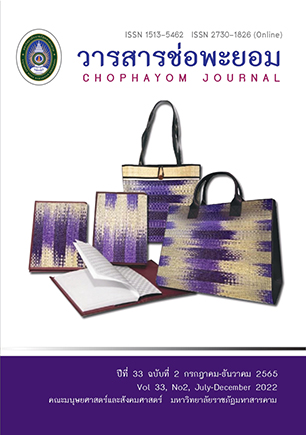Chinese Vocabulary Memorizing Strategies of Third Year Students, Majoring in Chinese Program, Faculty of Humanities and Social Sciences, Rajabhat Maha Sarakham University
Keywords:
Memorizing Strategies, Chinese VocabularyAbstract
This Research was mixed method research between quantitative and qualitative research, and the objectivity of this research was to study Chinese vocabulary memorizing strategies of the third-year students, majoring in Chinese Program, Faculty of Humanities and Social Sciences, Rajabhat Maha Sarakham University. The population was 72 third-year students, majoring in Chinese Program, Faculty of Humanities and Social Sciences, Rajabhat Maha Sarakham University, and the purposive sample was 37 third-year students, majoring in Chinese Program(Chinese for Profession) enrolled in semester 1/2022. The tools used for research and data collection were: Questionnaire and interview form about Chinese vocabulary memorization strategies of third-year students in Chinese Program, Faculty of Humanities and Social Sciences ,Rajabhat Maha Sarakham University. The research finding showed that 1)Applied Vocabulary Memorizing Strategy had the highest mean (=4.51) ,which used by students, majoring in Chinese Program, from the 2nd form; 2) the 26 students who used Applied Vocabulary Memorizing Strategy were the most, accounted for 70.2%from the 3th form; 3) Interviewing with 37 students majoring in Chinese Program, Faculty of Humanities and Social Sciences, Rajabhat Maha Sarakham University concluded that students would find a way to memorize words that was Applied Vocabulary Memorizing Strategy and was the most suitable for themselves from 5th from. Keywords: Memorizing Strategies, Chinese Vocabulary,
References
เขมิกา ทับทิมใส. (2546). การพัฒนาแบบฝึกกลวิธีการเรียนศัพท์ภาษาอังกฤษ ระดับชั้นมัธยมศึกษาปีที่ 3 โรงเรียนท่ามะกาวิทยาคม อำเภอท่ามะกา จังหวัดกาญจนบุรี. กรุงเทพฯ : มหาวิทยาลัยศิลปากร.
โชติกานต์ ใจบุญ. (2559). กลยุทธ์การจำและการสอนภาษาจีน. Proceedings. การประชุมวิชาการนำเสนอ บทความวิชาการระดับชาติ. กรุงเทพฯ: มหาวิทยาลัยธุรกิจบัณฑิตย์. 29-40
ถนอมพร เลาหจรัสแสง. (2550). นิยามเลิร์นนิงออปเจ็กต์ Learning Object เพื่อการออกแบบพัฒนา สื่ออิเล็กทรอนิกส์. วารสารเทคโนโลยีและสื่อการศึกษา มหาวิทยาลัยสุโขทัยธรรมาธิราช, 4(4), 50-59.
ถาวร สิกขโกศล. (2551). วิวัฒนาการของรูปลักษณ์อักษรจีน. ศิลปวัฒนธรรม. 29(12), 146-160.
เธียรชัย เอี่ยมวรเมธ. (1977). พจนานุกรมจีน-ไทย. กรุงเทพฯ : รวมสาส์น.
นพาวรรณ์ ใจสุข. (2556). การพัฒนาทักษะการจดจำคำศัพท์ภาษาจีนของนักเรียน ระดับประกาศนียบัตรวิชาชีพ ชั้นปี ที่ 2 (ปวช.2). สืบค้นเมื่อ30 พฤษภาคม 2565,จาก http://www.google.co.th/url]
นันทิดา ปินะสุ. (2555). การพัฒนาทักษะการจำคำศัพท์และการอ่านออกเสียงคำศัพท์ภาษาจีนโดยใช้การ์ดคำศัพท์ทบทวนตัวเอง. รายงานการวิจัย.ชลบุรี : วิทยาลัยเทคโนโลยีพนิชยการสัตหีบ.
นารีรัตน์ วัฒนเวฬุ. (2560). การศึกษากลวิธีการเรียนรู้คำศัพท์ภาษาจีนของนักศึกษาสาขาวิชาภาษาจีนคณะมนุษยศาสตร์และสังคมศาสตร์ มหาวิทยาลัยสงขลานครินทร์ วิทยาเขตปัตตานี. วารสารสงขลานครินทร์ ฉบับสังคมศาสตร์และสังคมศาสตร์, 23(1), 93-134.
นรินทชัย ฮะภูริวัฒน์.(2555). การพัฒนารูปแบบการเรียนการสอนภาษาจีนตามแนวคิดการเรียนรู้แบบเน้นงานปฏิบัติโดยใช้เทคนิคการจำตัวอักษรจีนแบบเชื่อมโยงเพื่อเสริมสร้างความสามารถในอ่านของนักศึกษาปริญญาตรี. (วิทยานิพนธ์ปริญญา ดุษฎีบัณฑิต,จุฬาลงกรณ์มหาวิทยาลัยกรุงเทพมหานคร).
ประยุทธ ไทยธานี. (2558). ความจำ(+) Humanities and Social Sciences Branch(+). นครราชสีมา : คณะครุศาสตร์ มหาวิทยาลัยราชภัฏนครราชสีมา.
ปิยะพันธ์ พิชญ์ประเสริฐ อัจฉรีย์ พิมพิมูล และมาลีรัตน์ ขจิตเนติธรรม. (2562). องค์ประกอบของรูปแบบการ เรียนรู้โดยใช้สื่อสังคมออนไลน์ตามแนวทฤษฎีการสร้างองค์ความรู้ด้วยตนเอง แนวคิดเดอะบิกซิกและกระบวนการเรียนรู้แบบกลุ่มสืบสอบ เพื่อพัฒนาทักษะด้านสารสนเทศสื่อและเทคโนโลยีในศตวรรษที่ 21 สำหรับนักเรียนชั้นมัธยมศึกษาตอนต้น. วารสารศึกษาศาสตร์ มหาวิทยาลัยบูรพา, 30(3), 174-184.
ยิ่งรัก ชุนชาติประเสริฐ. (2546). กลวิธีการเรียนภาษาจีนกลางของนักศึกษาไทย. กรุงเทพฯ : มหาวิทยาลัยธรรมศาสตร์.
ล้วน สายยศ, อังคณา สายยศ. (2527) ความถนัดด้านการเรียน. กรุงเทพฯ สุวีริยาสาส์น.
Downloads
Published
How to Cite
Issue
Section
License
Copyright (c) 2022 Chophayom Journal

This work is licensed under a Creative Commons Attribution-NonCommercial-NoDerivatives 4.0 International License.






